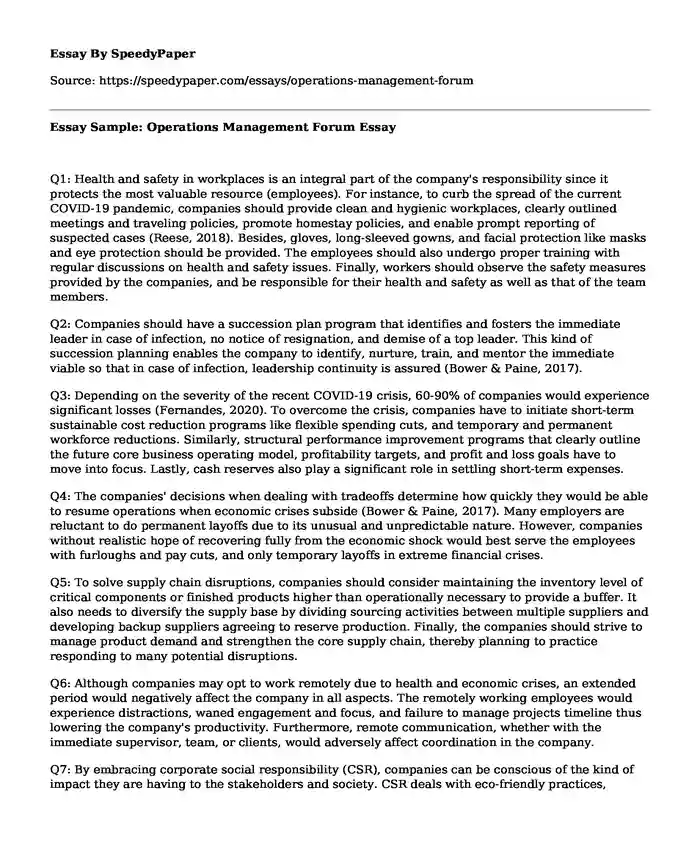
| Type of paper: | Essay |
| Categories: | Management Human resources Organizational behavior Covid 19 |
| Pages: | 3 |
| Wordcount: | 680 words |
Q1: Health and safety in workplaces is an integral part of the company's responsibility since it protects the most valuable resource (employees). For instance, to curb the spread of the current COVID-19 pandemic, companies should provide clean and hygienic workplaces, clearly outlined meetings and traveling policies, promote homestay policies, and enable prompt reporting of suspected cases (Reese, 2018). Besides, gloves, long-sleeved gowns, and facial protection like masks and eye protection should be provided. The employees should also undergo proper training with regular discussions on health and safety issues. Finally, workers should observe the safety measures provided by the companies, and be responsible for their health and safety as well as that of the team members.
Q2: Companies should have a succession plan program that identifies and fosters the immediate leader in case of infection, no notice of resignation, and demise of a top leader. This kind of succession planning enables the company to identify, nurture, train, and mentor the immediate viable so that in case of infection, leadership continuity is assured (Bower & Paine, 2017).
Q3: Depending on the severity of the recent COVID-19 crisis, 60-90% of companies would experience significant losses (Fernandes, 2020). To overcome the crisis, companies have to initiate short-term sustainable cost reduction programs like flexible spending cuts, and temporary and permanent workforce reductions. Similarly, structural performance improvement programs that clearly outline the future core business operating model, profitability targets, and profit and loss goals have to move into focus. Lastly, cash reserves also play a significant role in settling short-term expenses.
Q4: The companies' decisions when dealing with tradeoffs determine how quickly they would be able to resume operations when economic crises subside (Bower & Paine, 2017). Many employers are reluctant to do permanent layoffs due to its unusual and unpredictable nature. However, companies without realistic hope of recovering fully from the economic shock would best serve the employees with furloughs and pay cuts, and only temporary layoffs in extreme financial crises.
Q5: To solve supply chain disruptions, companies should consider maintaining the inventory level of critical components or finished products higher than operationally necessary to provide a buffer. It also needs to diversify the supply base by dividing sourcing activities between multiple suppliers and developing backup suppliers agreeing to reserve production. Finally, the companies should strive to manage product demand and strengthen the core supply chain, thereby planning to practice responding to many potential disruptions.
Q6: Although companies may opt to work remotely due to health and economic crises, an extended period would negatively affect the company in all aspects. The remotely working employees would experience distractions, waned engagement and focus, and failure to manage projects timeline thus lowering the company's productivity. Furthermore, remote communication, whether with the immediate supervisor, team, or clients, would adversely affect coordination in the company.
Q7: By embracing corporate social responsibility (CSR), companies can be conscious of the kind of impact they are having to the stakeholders and society. CSR deals with eco-friendly practices, promoting voluntarily professional work, financial contributions, product donations, and employee-community service days. In 2020, CSR has incorporated employees' safety both at work and through policies that promote safe working and leave conditions due to the pandemic (Fernandes, 2020). Moreover, companies have to protect their broader communities to make efforts to maintain infrastructure in ways that deliver needed healthcare, medical supplies, and staples to the vulnerable.
Q8: All industries have been affected by the COVID-19 crisis, with varying degrees of severity (Fernandes, 2020). The impact poses various challenges such as workforce disruption, market accessibility, supply chain disruption, short-term liquidity challenge, substantial IT challenges, and changes in consumer behavior. Besides, creating a distinction in the marketplace for customers to differentiate the company's product from the competitor's is yet a challenge. Most of these challenges that the companies are facing are anticipated to continue in the next five years.
References
Bower, J. L., & Paine, L. S. (2017). The error at the heart of corporate leadership. HBR’S 10 MUST, 165.
https://www.hbs.edu/faculty/Pages/item.aspx?num=52623Fernandes, N. (2020). Economic effects of coronavirus outbreak (COVID-19) on the world economy. Available at SSRN 3557504.
https://papers.ssrn.com/sol3/papers.cfm?abstract_id=3557504Reese, C. D. (2018). Occupational health and safety management: a practical approach. CRC press.https://www.routledge.com/Occupational-Health-and-Safety-Management-A-Practical-Approach-Third/Reese/p/book/9781138749573
Cite this page
Essay Sample: Operations Management Forum. (2023, Aug 21). Retrieved from https://speedypaper.com/essays/operations-management-forum
Request Removal
If you are the original author of this essay and no longer wish to have it published on the SpeedyPaper website, please click below to request its removal:
- My Handover of Corporate Recruitment Division - HRM Essay Sample
- Healthy Ageing
- Essay Example: Layoffs in Human Resource Management
- Essay Sample: The Treatment Plan
- Free Essay: Digitalization of the Purchase and Supply Management
- Essay Sample on Decontamination Principles
- Essay Sample on Building an Emotionally Intelligent Organization
Popular categories




